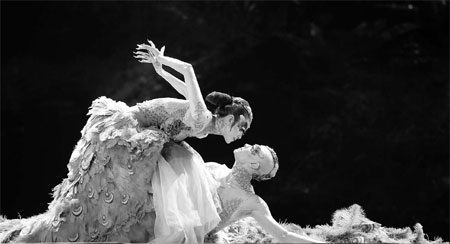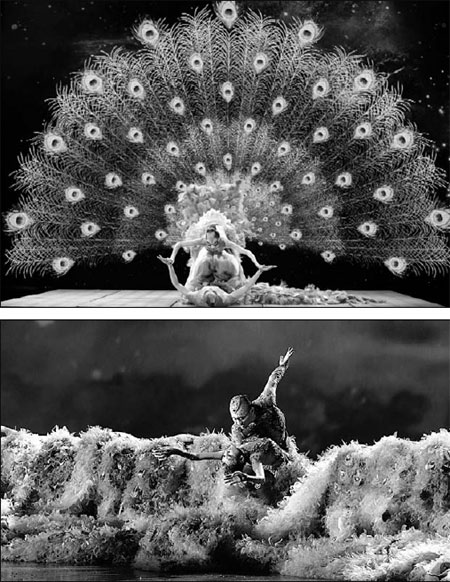Hard ACT to follow
Updated: 2013-04-04 08:12
By Cai Xiao (China Daily)
|
||||||||
|
Yang Liping and her partner perform during their first show in Kunming, Yunnan province, in August, 2012. The Peacock tour led by Yang started in Kunming. Provided to China Daily |
|
Yang has managed to do something which up until now, has proved difficult for many companies in the arts and cultural sector - attract serious investment. Provided to China Daily |
A huge name in Chinese entertainment, dancer Yang Liping is now hoping for a second career as a businesswoman, Cai Xiao discovers.
In Yang Liping's mind, dancing is the happiest thing in the world. She says she can still stand in front of a mirror for hours practicing her movements. Throughout her career, the 54-year-old has considered dance as her life - but of course, life moves on, and in September she will leave the stage, soon after her current farewell tour finishes, and devote her time to maintaining and developing future dance shows, in cooperation with some heavyweight financial investors.
"Art and capital are not contrary - they work together, " she said.
In just that kind of cooperation, she has just agreed a deal in which Shenzhen Capital Group Co Ltd, a leading Chinese private equity firm, has invested 30 million yuan ($4.8 million) in her Kunming-based Yang Liping Arts & Culture Ltd, for a 30 percent stake in the business.
Arguably one of the most investable entertainment stars in China now hopes the cash injection will mark the start of a successful second career, as a businesswoman.
But Yang has managed to do something which up until now, has proved difficult for many companies in the arts and cultural sector - attract serious investment.
It was in 1979, that the 21-year-old Yang first started capturing the public's imagination in Yunnan province, starring in the dance show, "Princess Peacock".
By 1986, she had raised her profile around China, and by then was starring in the solo dance show, "Spirit of Peacock".
But it wasn't until 2000, that Yang started thinking about combining her art, with business.
After leaving the Central Ensemble of National Minorities Songs and Dances, a national art performance troupe, she was left without the comfort of national funding, and was forced to think how she could finance her future.
In 2002, she started creating an original ethnic stage show, "Shangrila - Dynamic Yunnan" (the Yunnan Show), hand-picking performers from the mountain areas of Yunnan province.
But early investors in the show could not understand her idea of using just amateur dancers, and withdrew their funding.
But Yang refused to give up.
To cover her costs, she took out loans, sold her house, performed in other shows, and crucially appeared in advertisements.
As such a star, she could sometimes earn as much as 100,000 yuan per day from a commercial, enough to finance her company and her staff for two months.
The Yunnan Show opened in 2003 in Kunming to huge acclaim, and Yang Liping Arts & Culture was set up a year later.
The show then toured China and more than 50 other countries and regions. It is still being performed in Kunming today, and is now considered one of China's most successful, and high-profile, long-running shows.
It certainly had a profound effect on Wang Yanwu, when he saw it in 2006.
Then a managing director at Swiss bank UBS, he was so impressed by it, he volunteered to work for Yang's company in his spare time.
He mentioned his involvement with Yang Liping Arts & Culture at an investment forum in 2011, drawing the attention of Xu Xiang, the head of the Southwest China region at Shenzhen Capital Group - and after several rounds of talks, their investment partnership was sealed.
Wang formally became full-time general manager of Yang Liping Arts & Culture as a condition of the deal.
"Yang Liping is one of the world's greatest dancers, and we feel confident her company will develop.
"She has gathered some first-class talent and her performances are of the highest quality," Xu said.
"We are helping to expand the company's distribution by setting up new theaters, and plan to have it listed in three to five years."
Two new theaters are planned, in the tourism cities of Lijiang and Dali, in Yunnan province, as fixed sites for Yang's future dance shows.
Xu said that in Lijiang, construction should be finished by the end of 2013, and is projecting an annual revenue of 50 million yuan. The Dali theatre is scheduled to be finished by 2015.
The theatre in Kunming has been operating for 11 years, with its annual revenue in 2011 of almost 20 million yuan accounting for about 50 percent of the company's total revenue, the remainder coming from touring and from independent companies paying to perform Yang's shows.
But investing in arts and culture is still in its infancy in China, and many venture capitalists and investors remain skeptical about it, much like many still remain nervous about investing in biotech or any other newer investment sector.
"In the culture sector, the creators are the most important people," explained Wang.
"Yang Liping has accumulated decades of performance experience, and this is really a 'golden time' in her career," he said - meaning a time when she can take full commercial advantage of her name and her skills.
According to Wang, its shows in Yunnan, as well as the ever-popular "Peacock" performances, continue to be sold-out with audiences from home and abroad providing the company with a solid, well-proven income stream.
They are now starting to authorize performances of the original shows to other regions outside Yunnan, illustrating a business with ambition, and expansion plans.
Its latest cooperation agreement for a Peacock show has been signed with Hangzhou Gold Coast Culture Development Co Ltd, for performances in Hangzhou, capital of Zhejiang province.
"We pay particular attention to innovation, and try to combine dance with acrobatics and drama, for instance, to present new, high-quality performances," added Wang.
In December 2010, Chinese equity investment firm Yunfeng Capital announced an investment of $50 million in the Beijing-based Impression Inc, a company founded by three famous directors - Zhang Yimou, Wang Chaoge and Fan Yue - which is dedicated to creating, producing, and managing large outdoor productions.
Its six outdoor shows staged so far have reflected local views and traditions in the cities of Guilin, in Guangxi Zhuang autonomous region, Lijiang in Yunnan province, Hangzhou and Putuo in Zhejiang province, Haikou in Hainan province, and Wuyishan in Fujian province.
By the end of September 2010, the show in Guilin had sold more than 5.9 million seats.
"Top celebrities in the culture sector, such as Zhang Yimou and Yang Liping, can attract investment to develop their performances - but raising funds in the sector can still be difficult," said Quan Junmin, the president of Shanghai Jiangzhou Drum Co, which owns the only national academic drum troupe of China.
However, the troupe is constantly under financial pressure, and according to Quan, it is often the investors themselves who find it hard to identify a sure bet.
Differentiating between outstanding performance companies and ordinary ones can be tricky, and so his team has to work hard to find a winning brand.
"Investment in the cultural sector, especially assessing something as abstract as performance, is at its very early stages in this country, but happily we have been one of the first to eat crab," added Xu Xiang.
His successful investment record in the cultural sector so far has now led SCGC to make an investment in Chinese online video website, LeTV.com with two partners, worth 45 million yuan.
LeTV.com listed on China's Nasdaq-style Growth Enterprises Market in 2010, and SCGC's investment return is expected to be more than 20 times.
According to the latest estimates, there have been 116 cultural industrial investment funds created in China, of which 35 are equity investment funds.
First phase funding has totaled 45.9 billion yuan, according to Guangming Daily.
But according to the latest figures, of the money raised to invest in the arts and creative industries, only around half has actually been invested, because solid, potential investment targets remain scarce.
The cultural investment market remains at a "low level" and there are few large companies experiencing anything like high growth, added Wei Pengju from the Creative Culture Research School at the Central University of Finance and Economics.
Of around 53 investment deals believed to have been completed by those cultural industrial investment funds, 23 were related to film and television, and eight to tourist performing arts, Guangming Daily reported.
The paper said that increasingly those funds are now looking at helping smaller companies, with good business performances, in the hope of finding the next big hit, or creative company.
Contact the writer at caixiao@chinadaily.com.cn
(China Daily 04/04/2013 page9)

 In Photos: 7.0-magnitude quake hits Sichuan
In Photos: 7.0-magnitude quake hits Sichuan
 Li Na on Time cover, makes influential 100 list
Li Na on Time cover, makes influential 100 list
 FBI releases photos of 2 Boston bombings suspects
FBI releases photos of 2 Boston bombings suspects
 World's wackiest hairstyles
World's wackiest hairstyles
 Sandstorms strike Northwest China
Sandstorms strike Northwest China
 Never-seen photos of Madonna on display
Never-seen photos of Madonna on display
 H7N9 outbreak linked to waterfowl migration
H7N9 outbreak linked to waterfowl migration
 Dozens feared dead in Texas plant blast
Dozens feared dead in Texas plant blast
Most Viewed
Editor's Picks

|

|

|

|

|

|
Today's Top News
Live report: 7.0-magnitude quake hits Sichuan, heavy casualties feared
Boston suspect cornered on boat
Cross-talk artist helps to spread the word
'Green' awareness levels drop in Beijing
Palace Museum spruces up
First couple on Time's list of most influential
H7N9 flu transmission studied
Trading channels 'need to broaden'
US Weekly

|

|









